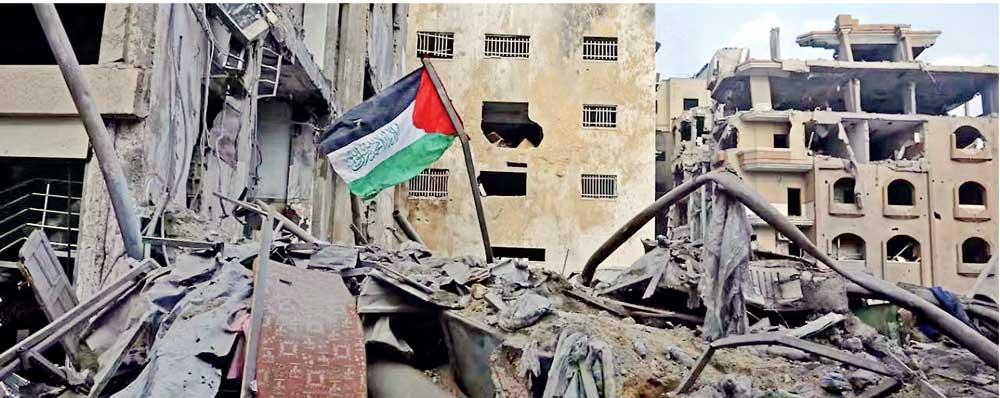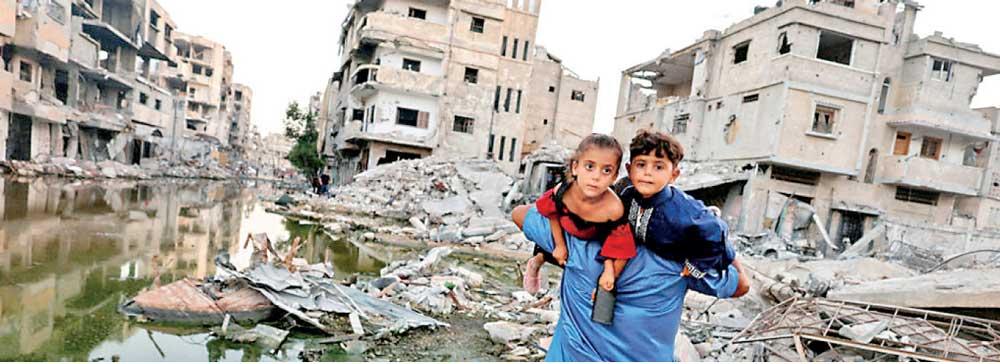05 Oct 2024 - {{hitsCtrl.values.hits}}

 For the past 12 months the world has watched Gaza descend into unprecedented violence and humanitarian catastrophe. With calls for an immediate ceasefire growing ever more urgent, the Palestinian struggle reverberates across borders, deeply touching those still healing from the wounds of conflict, as well as those who identify with the pursuit of justice and freedom. Despite many only now understanding the situation in Gaza, the ongoing tragedies have been a painful reality for the Palestinian people for over 70 years – years which have been marked by displacement, occupation, as well as relentless and systemic oppression.
For the past 12 months the world has watched Gaza descend into unprecedented violence and humanitarian catastrophe. With calls for an immediate ceasefire growing ever more urgent, the Palestinian struggle reverberates across borders, deeply touching those still healing from the wounds of conflict, as well as those who identify with the pursuit of justice and freedom. Despite many only now understanding the situation in Gaza, the ongoing tragedies have been a painful reality for the Palestinian people for over 70 years – years which have been marked by displacement, occupation, as well as relentless and systemic oppression.
The destruction of Palestine can be traced back to the 1917 Balfour Declaration, which laid the groundwork for the creation of Israel and advanced the Zionist agenda, paving the way for the emergence of its oppressive apartheid regime. Since then, Palestinians have endured unrelenting abuse, loss, land confiscation, forced evictions, and a suffocating blockade that has transformed Gaza into the world’s largest open-air prison.
The First Intifada in 1987, meaning “uprising” in Arabic, marked a pivotal moment in Palestinian resistance. During this period, both the Palestine Liberation Organization (PLO) and Hamas garnered substantial support, reflecting deep-seated anger and frustration of Palestinians who had survived decades of mistreatment and unfulfilled aspirations of statehood.
More recently, Hamas made global headlines following the October 7th attacks in Israel, which resulted in the deaths of 815 civilians. Classified as a terrorist organisation by the United Kingdom, Israel, and the United States, the struggle for Palestinian liberation has become entangled with Hamas and by extension, the notion of terrorism. This is an association that, in a post 9/11 world, has had deeply detrimental consequences on a global scale. Today, the actions of a small minority have been continuously weaponised against Muslims and Arabs worldwide, often under the guise of self-defence, further fuelling their widespread dehumanisation – as seen in the ongoing mass-slaughter of Palestinians.
Regarding Israel, the pretext of self-defence against Hamas raises significant concerns, particularly around the issue of proportionality. Proportionality is a critical principle in the theory and ethics of war, with it limiting the extent of damage that can be considered as justifiable – a fundamental concept which Israel has repeatedly violated. Within political conflicts and violence, the “look what they did to us” mentality is common tactic, where aggressors justify their actions in the name of self-defence, no matter what. True to form, Israel has a well-established reputation for using disproportionate force in its conflicts, with both past and present assaults on Lebanon and Gaza descending into sheer carnage. These attacks have claimed the lives of countless civilians, including children, who are all too often dismissively categorised as ‘collateral damage’, rather than innocent victims of war crimes.

For the sake of discussion, even if we were to accept Israel’s actions as being legitimate, the critical question remains: if Hamas’ actions on October 7th justify Israel’s ongoing assault on Gaza and neighbouring regions, what limits remain on the scope of retaliation? What distinguishes one side’s actions as terrorism, while framing the other’s as a rightful response? Is it a matter of ethnicity? Religion? Or is it something more deeply ingrained in the power structures of society? A colonial double standard perhaps – one the world has witnessed far too many times.
With the international community’s consistent leniency and seeming indifference towards Israel’s well documented war crimes, the question of accountability and legitimacy becomes even more pressing, especially through racial and social lenses.
A further contradiction lies within Israel’s stance on Hamas itself. Despite its current designation of Hamas as a terrorist organisation and a stated objective to dismantle it, Prime Minister Benjamin Netanyahu and his various governments have previously extended both political and financial support to the group.
This controversial strategy sought to fracture Palestinian resistance, weakening its unified push for statehood. By elevating Hamas, the PLO’s influence waned, leading to Hamas’ 2006 electoral victory and control over Gaza, inadvertently bolstering Israel’s security interests and power. To this day, Palestinian governance remains disjointed, with Hamas ruling Gaza and the Fatah party administering parts of the West Bank, while Israel retains substantial control, particularly regarding security and settlement expansion. This internal division has paradoxically strengthened Israel’s strategic position, reinforcing its dominance and regime across the region – but at what cost?
Ever since October 7th 2023, the Gaza Health Ministry has reported 41,252 deaths, including 16,500 children, with over 10,000 still missing beneath the rubble and an additional 1.9 million internally displaced. A comprehensive 649-page report from the Ministry reveals that the first 14 pages alone are dedicated to children who have been killed, aged just 0 to 1 year. The Lancet, a renowned British medical journal, estimates the death toll could be as high as 200,000 by the end of the year, factoring in those directly and indirectly affected by bombings, gunfire, manmade famine, disease, and other crisis-related causes.
Since the onset of the current assault, the Israeli military has dropped 75,000 tonnes of explosives on the Gaza Strip – five times the 15,000 tonnes that fell on Hiroshima – within an area measuring just 41km in length (Colombo to Katunayake) and 6 to 12km in width (Colombo to Kirulapone and to Boralesgamuwa).
Research indicates that children are significantly more likely to die from blast injuries than adults. Given that nearly half of Gaza’s population is under 18, it becomes clear that this is a war on children. Even if a child survives the bombings and drone strikes, the psychological and physical trauma they endure is life-altering. Nearly every child in Gaza is suffering from PTSD, 17,000 have been orphaned, and an average of 10 children lose a limb every day. The future Palestinian generation is being irreparably scarred, leaving behind a legacy of irreversible damage and international shame.
Confronted with this harsh reality, what is preventing the international community from intervening? Israel has systematically targeted journalists, aid workers, medical personnel, activists, UN staff, and civilians, deliberately carpet-bombing schools, refugee camps, hospitals, and bakeries. According to Save The Children and UNRWA’s Data, Gaza has been intentionally transformed into one of the deadliest places for both children and aid workers by Israeli forces. Yet, Israel continues to be cast as a victim and, in some instances, even lauded for its ingenuity and right to exist – a right Palestinians are persistently denied.
At the heart of this inaction lies systemic racism and Islamophobia. These ideologies, which have served time and time again to legitimise violence against indigenous people, are heavily interwoven with Zionist propaganda, portraying the Palestinian struggle for rights as a security threat.
This narrative not only dehumanises Palestinians, but also perpetuates harmful stereotypes, falsely suggesting that their fight for liberation is rooted in antisemitism rather than anti-colonialism. Such a premise absurdly implies that Palestinians would simply not resist occupation by non-Jews – an assertion that is both flawed and deeply malicious.
British-Israeli historian Avi Shlaim has argued that antisemitism within itself has been weaponised to whitewash the Israeli apartheid, enabling the continued occupation and reinforcing structures of white supremacy.
The differences between anti-Zionism and antisemitism must not be conflated, as the two not only obscure genuine legitimate critiques of Israeli policies, but also undermine the rich and ethical traditions of Judaism itself. Zionism, with its roots deeply ingrained in colonialism and exclusion, damages both Jewish values, and humanity at large. What we witness in Gaza today is not new. It lays bare not only the utter disregard for brown and Muslim lives, but also reaffirms an age-old colonial truth: that some lives are simply deemed less valuable than others.
So, what are we left with? Faced with an issue so deeply ingrained in the fabric of the oppressor, how can we, as civilians halfway across the world, intervene meaningfully? At this moment, remaining unaware of the ongoing war on Gaza is a conscious choice – one that far too many people make. Yet, there is hope for change and hope for a free Palestine.
First, we must confront our own privileges. Regardless of our social upbringing or background, our ability to simply turn off the news is a luxury we cannot afford. We must keep our eyes and minds open, continuously educating ourselves and those around us.
Pressure your local representatives to advocate for Palestinian rights, support organisations that provide humanitarian aid to Gaza, and engage in boycotts and divestment campaigns against companies complicit in the occupation. Joining protests and solidarity movements, promoting Palestinian art and culture, all whilst actively combating Islamophobia and racism within our own communities are crucial steps we can take.
As we reach a full year – 365 days of merciless suffering – since the onset of this brutal war on Gaza, I leave you with this: calling for an end to the mass slaughter of children and demanding an immediate ceasefire is not radical, nor controversial – it is a basic moral obligation.
As human beings, we are bound by a collective duty to raise our voices for the voiceless, to confront injustice wherever it festers. The time has come to end the senseless bloodshed and to ensure that freedom and peace prevail in Palestine. If we stay silent, we will not just witness the destruction of Palestine and its people, but the collapse of our shared humanity.
About The Writer:
Camille-Juliette Roelens is a Franco-Sri Lankan British Criminology graduate from the University of Birmingham, UK.
25 Dec 2024 3 hours ago
25 Dec 2024 3 hours ago
25 Dec 2024 3 hours ago